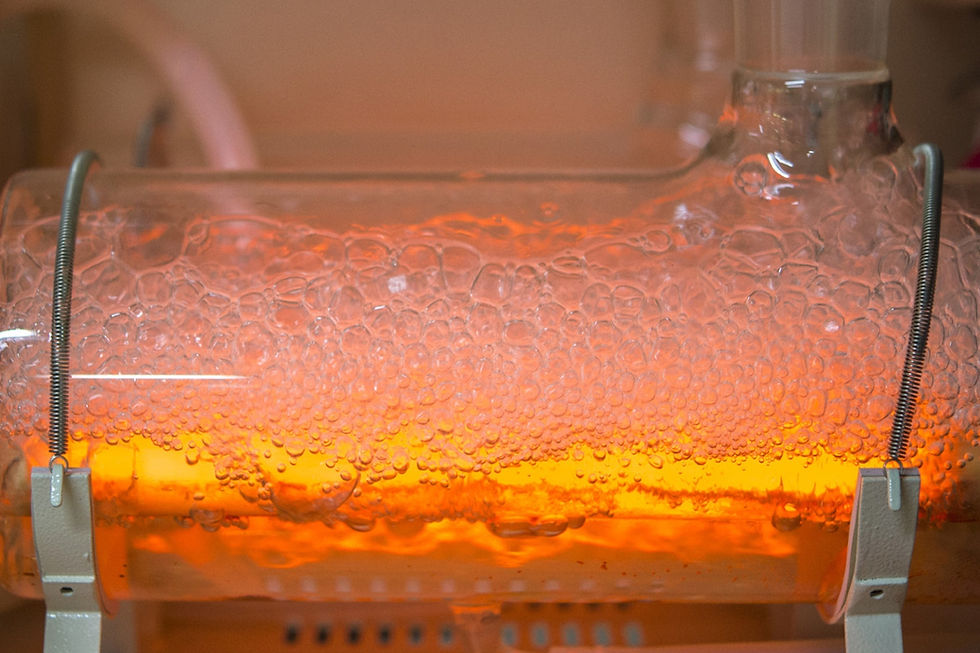Quantum Graphite financial update sets graphite project NPV of $497m
- Michael Philipps

- Dec 11, 2023
- 3 min read
Updated: Apr 3, 2024

Quantum Graphite has outlined an internal rate of return of almost 50 per cent and a net present value (NPV) of more than $497 million following a financial update of its Uley 2 graphite project in South Australia.
The latest data follows an independent assessment by Lycopodium Minerals that identified doubling the project’s mill throughput up to 1.2 million tonnes a year would lift production from 55,000 dry metric tonnes of flake graphite up to a maximum of 100,000 dry metric tonnes.
According to the latest economic figures and based on the operation’s mineral resource, Quantum expects revenue of more than $1.28 billion at an estimated total operating cost of almost $26 million per year, or $21.615 per tonne. The figures outline the financial impact of Lycopodium’s value engineering assessment released by Quantum last month.
Uley 2 holds a resource of 6.3 million tonnes at 11.1 per cent total graphitic carbon (TGC) for a total inventory of 697,000 tonnes of contained graphite. However, Quantum believes its exploration plan has the potential to unlock a significant upgrade to the resource and ensure a suitable extension to its projected mine life.
Management says it has adopted an enhanced basket price following its review of market conditions and information provided by its offtake partner, MRI Trading AG. The basket price has been increased from the previous DFS figures released in late 2021 by about 33 per cent, from US$919 (AU$1395.90) per dry metric tonne to US$1225 (AU$ 1860.70).
Quantum says doubling the mill throughput at Uley 2 will decrease processing costs by a whopping 50.8 per cent, with an estimated total capital cost of about $152 million.
Earlier this year, Quantum achieved flake purity grades of 99.99 per cent graphitic carbon following thermal purification results from its final phase of testing on samples from Uley 2. The flake was treated at a thermal temperature of 2850°C to achieve the impressive purity levels using a testwork program conducted by Germany’s Institute of Nonferrous Metallurgy and Purest Materials, ProTherm Systems and Sunlands Power.
The company and its joint venture partner Sunlands Co are working together to develop thermal energy storage cells using natural flake graphite after launching independent testwork to accelerate the commercialisation of the technology. Management says the devices could provide long-duration energy solutions and play an integral role in delivering stable and flexible energy to grids dependent on renewable power.
In March, first-phase testwork on the company’s Uley coarse-flake graphite achieved a purity of 97.59 per cent graphitic carbon at 2200°C and the company predicted increased temperatures would raise that mark to the 99.5 per cent needed for anode production. The recent results surpassed management’s expectations to achieve the 99.99 per cent purity.
Quantum says mining at the SA-based operation will use conventional open-pit methods, using 100-tonne diesel hydraulic excavators and 60-tonne off-highway dump trucks, with an assumed mining recovery of 95 per cent.
While mining development is subject to the approved Program for Environmental Protection and Rehabilitation regime and relevant environmental licensing mandated under SA legislation, the company believes there are no known impediments to obtaining a license to operate in the area.
Management expects the economics of Uley 2 can be further boosted by adopting Sunlands’ technology, with a decision to produce high-purity graphite (HPG) expected before the end of the year.
Considering the current economic viability of the project before a decision to produce HPG, the market will be keeping a close eye on Quantum’s upcoming decision on whether to advance using Sunlands’ licensed technology.
Is your ASX-listed company doing something interesting? Contact: office@bullsnbears.com.au


